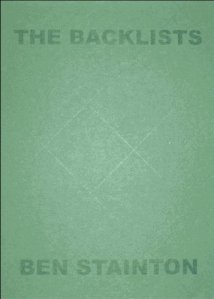‘The Backlists’ by Ben Stainton
-Reviewed by Ian Chung–
On the back cover of The Backlists, Todd Swift describes Ben Stainton’s chapbook from The Knives Forks and Spoons Press as ‘challenging both lyric and avant-garde modes’. This remark is borne out by the chapbook’s first poem, ‘Off the Barents’. This poem is awash with images that taken in isolation are themselves already charged and evocative (‘a pleural sac takes on black air’, ‘our tramping ground a piece of carpet Delilah / cut off after the war’), but placed together, they act to rough up the poem’s texture and trip up the reader. After all, this is a poem that initially appears to be about deep-sea divers in the Arctic, but ends with the utterly incongruous lines (which contain a pun about ham hock as a cut of meat from a pig), ‘DIVERS PERISH AFTER STUPID GOOSE-CHASE / ‘Is there any other kind?’ the big old pig / hocked up into Marie’s burger’.
‘Off the Barents’ makes for a good opening poem because it introduces poetic techniques that Stainton continues to employ throughout The Backlists. The most obvious is Stainton’s usage of what Swift calls ‘idiosyncratic typography, as delightfully original as e.e. cummings’. Within the first four lines, there is a mixture of italicised, broken and capitalised words. The two instances of broken words in the poem (‘pea / s / eek’ and ‘clod / s / scrabble) are especially interesting because of how sense carries over the line, with the typography indicating that the single letter belongs to the next line’s word, and yet the letter would make equal sense by forming the plural of the preceding noun, which is what the eye scanning across the line would instinctively do. The effect is to foreground the malleability of language, showing how its meaning is (de)constructed by the very act of reading.
Another technique that Stainton makes use of is the repetition of whole phrases with subtle variations that affect their meaning. In ‘Off the Barents’, the phrase ‘DEEP-SEA GOOSE-CHASE’ becomes ‘STUPID GOOSE-CHASE’, marking a shift from the purely descriptive to a value judgement. Midway through the chapbook, in ‘Parkin’s Rooms’, ‘We’ll both be eaten by / hours, by mislaid flowers, my northern caff’ undergoes a noun swap to become ‘We’ll both be eaten by flowers, by mislaid / hours, my northern town’, transforming the poem into the site of surreal scenes, where ‘One boy trips over / another’s tongue’. Amidst this hazy atmosphere, the sexual also begins to infiltrate the poem, ‘Miss King rinsing her parts / in the bathroom of my mind’, only to be rudely punctured by the final line of the poem, isolated into its own stanza: ‘She kept her blouse intact. What a cheek.’
Even when Stainton eschews such word games in favour of a more straightforward ‘narrative’ in the poem, moments of sexually-inflected oddness still persist in erupting. In ‘A Dream, Found in the Papers’, the first sign of this is the opening stanza ‘I realise the severity of the situation / when she removes her underwear – / a wicker building where the vagina should be’, but the reader is soon ambushed by further bizarreness:
‘Have you ever considered italicising your sex life?’
Squeaking last-minute directions onto a whiteboard,
she sucks my clothes up a thin proboscis.
Sex Education needs a serious rethink, I think.‘
My favourite moments in The Backlists, however, come in shorter poems like ‘Tasks’ and ‘Geneva’. ‘Tasks’ is unpunctuated, which allows for all the lines to be parsed in several ways. As an example, consider the opening lines, ‘Create the perfect sandwich using only Kraft lose at least $25 / before Lent learn to relish the taste of loss’. The first task could terminate with ‘Kraft’, but consider the odd humour of an alternative reading like ‘using only Kraft lost at least $25’. The phrase ‘before Lent’ could also be added on to this, or it could be read as part of a new task beginning at ‘lose’, but interpreting the task as ‘before Lent learn to relish the taste of loss’ invokes a sentiment that would be perfectly at home in the lyric mode. With ‘Geneva’, the second stanza is almost haiku-like in its compression of imagery: ‘the embassy hosted a glittering ball / but we (now tangled at the neck) / lost our invites in the fog’. Yet that italicised phrase skews what would otherwise be a clichéd moment of two people sharing a kiss into a deliberately awkward but refreshing image.
I believe the examples cited above demonstrate what Swift means when he describes Stainton’s poems as ‘pivot[ing] on the expected – film, sex, travel, good – then go[ing] off in all directions at once’. This is poetry that demands to be reread, in order for the different possibilities of its meaning to emerge. This is where Stainton’s unusual typography actually works to slow the reading process down, so that the poems resist quick scanning for meaning, their content and form working synergistically. Readers who share Stainton’s respect for language will appreciate the unsettling effects he achieves through linguistic bricolage, allowing words and images that might not otherwise share a poem, a line, to rub up against each other.


